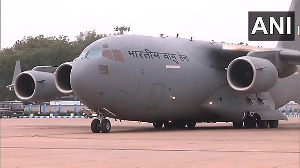Mumbai Metro One Pvt Ltd Director, K P Maheshwari on Wednesday announced in Mumbai that the city's first metro project between Versova-Andheri-Ghatkopar will be commissioned in 30 months instead of the stipulated 60 months.
The company, formed by a Reliance Energy-led consortium, began work at J B Nagar on February 8. ''Provided all other things are in place, we should be able to deliver the project in 30 months,'' Maheshwari said in a statement.
The Mumbai Metropolitan Region Development Authority (MMRDA) is sorting out issues related to the handing over of certain right-of-ways and land at D N Nagar for a Metro depot.
Conceding that meeting its self-imposed target would be a tall order, Maheshwari said, the company was nevertheless confident of achieving it. ''We have a wealth of experience and expertise,'' he observed. ''The idea is to deliver the Metro to the people at the earliest and provide an early relief to their commuting woes.
Instead of the 45 days commonly given to contractors to begin work, Mumbai Metro has given its contractor for viaducts, Simplex Infrastructure, only 10 days after approval,'' Maheshwari said.
The Director stressed at the same time, however, that no compromise whatsoever will be made on the quality or the safety in the construction of the Rs 2,356 crore (Rs 23.56 billion) project to meet the deadline.
The project promoters are hopeful of meeting the deadline in spite of huge engineering challenges such as sharp turns and constraints such as ceaseless traffic, and some permanent structures along the route.
''Expediting will involve no compromise on quality. In fact, we're picking our way about with great caution,'' he said. Apart from using state-of-the-art technology at all levels, ''over-arching safeguards'' are being put in place, Maheshwari said.
To ensure that underground pipelines and cables utilities are not disturbed by the piling work undertaken to lay the foundation of the Metro, the company has approached all utilities such as BEST, BMC, MGL, MTNL, Reliance Energy and Tata Power, to prepare maps.
After receiving mapping data from the utilities, the company has further used Ground Penetrating Radar (GPR) systems, which uses electro-magnetic waves through the grounds for identification of cables and pipes.
In keeping with internationally accepted standards, test piles will be placed at every one km before actual piling. ''Since Mumbai has poor quality soil, we have to be very particular. The test pile is given 28 days to withstand a load that is 300 per cent higher than the actual load envisaged. In the rare case a test pile fails the test, then we increase the pile length and socketing that, drill the rock deeper,'' said Maheshwari.






